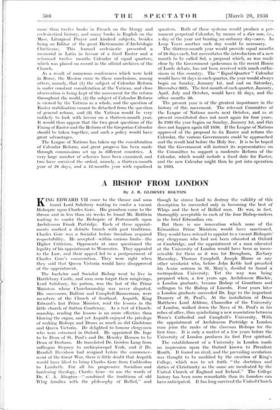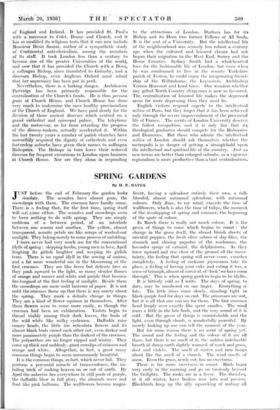A BISHOP FROM LONDON
By J. R. GLORNEY BOLTON
The bachelor and Socialist Bishop went to live in Hartlebury Castle, and men soon forgot their misgivings. Lord Salisbury, his patron, was the last of the Prime Ministers whose. Churchmanship was never disputed. His successors, Balfour and Campbell-Bannerman, were members of the Church of Scotland. Asquith, King Edward's last Prime Minister, read the lessons in the little church of Sutton Courtenay. As a test of Church- manship, reading the lessons is no more effective than blowing the organ, and yet Asquith enjoyed the privilege of making Bishops and Deans as much as did Gladstone and Queen Victoria. He delighted to honour clergymen who were esteemed in Oxford. He appointed Dr. Inge to be Dean of St. Paul's and Dr. Hensley Henson to be Dean of Durham. He translated Dr. Gordon Lang from suffragan Stepney to archiepiscopal York, and if Dr. Randall Davidson had resigned before the commence- ment of the Great War, there is little doubt that Asquith would have liked to bring Charles Gore from Cuddcsdon to Lambeth. For all his progressive Socialism and hardening theology, Charles Core—to use the words of Dr. C. A. Alington—" combined the traditions of old Whig families with the philosophy of Balliol," and though he strove hard to destroy the validity of this description he succeeded only in becoming the 'best of Whigs and the best of Balliol men. He was, in fact, thoroughly acceptable to each of the four Bishop-makers in the brief Edwardian era.
But there is one innovation which none of the Edwardian Prime Ministers would have sanctioned. They would have refused to appoint to a vacant Bishopric' any clergyman who had not been educated at Oxford or Cambridge, and the appointment of a man educated at the University of London would have been. as incon- ceivable for them as it was for Brougham, Zachary Macaulay, Thomas Campbell, Joseph Hume or any other secularist who, before John Keble had preached his Assiie sermon in St. Mary's, decided to fonnd• metropolitan University. Yet the way was being prepared when, a few years ago, Archdeacon Blackie, a London graduate, became Bishop of Grantham and suffragan to the Bishop of Lincoln. Four years later a London graduate succeeded Dr. Inge to the important Deanery of St. Paul's. At the installation of Dean. Matthews Lord Athlone, Chancellor of the University of London, walked down the Nave of St. Paul's in his robes of office, thus symbolising a new association between Wren's Cathedral and Campbell's University. With the appointment of Archdeacon Partridges London man joins the ranks of the diocesan Bishops for the first time. It is only a matter of a few years before the University of London produces its first Peer spiritual.
The establishment of a University in London made no impression upon the Oxford known to President Routh. It feared no rival, and the prevailing secularism was thought to be modified by the creation of King's College, which was to set forth " the doctrines and duties of Christianity as the same are inculcated by the United Church of England and Ireland." The College history has been more remarkable than its founders can have anticipated. It has long survived the United Church of- Englandand Ireland. It has provided St. Paul's with a.-successor to Colet, Donne and Church, and it hits so modified its religious tests that it can now include Monsieur sieur ,Denis Saurat, author of a sympathetic study of Continental . anti-clericalism, among the members of its staff. It took London. less than a- century to become . one of the greater Universities of the world", and now that it has provided the Church Fith a Dean; a suffragan Bishop, since translated, to Grimsby, and a diocesan Bishop, even Anglican Oxford must admit that her supremacy has been put in peril. Nevertheless, there is a lurking danger. Archdeacon Partridge has been primarily responsible for the centralisation of the Church's funds. He is thus persona. grata at Church , House, and Church House has done very 'mu.Ch,to undermine the once healthy provincialism Of the church of England. We have paid dearly for the division 'of those and dioceses which .centred on a, grand cathedral and ePiscoPal 'palace.: The telephone and the .Motor-car, so far from retarding the progress of, the diOceSe-makers, actually accelerated it. 1!Vithin the last ,twenty years a number of parish churches have unworthily, acquired the dignity of cathedrals and eyen. featurelests suburbs have given their names to suffragan Bishoprics. The Bishops in turn leai'e their. reduced. dioceses foie frequent excursions to*Loncion upon business at Church, Douse. Nor are .they alone' in *responding to the attractions ,of London. Durham has for its Bishop and its Dean two former Fellows of All Souls. It is the seat of a Uniyersity. But the intellectual.
of the neighbourhood was scarcely less robust a century, ago when the cultured and. leisured classes had not begun their Migration to the West End, Surrey and the Home Counties. Sydney Smith had a wholehearted love for the fashionable life of London, but even when he was condemned to live in the remote Yorkshire parish, of Foston, he could enjoy the invigorating friend- ship_ of the Wilbrahams, the Leyeesters, Archbishop Vernon Harcourt and Lord Grey. One wonders whether any gifted North Country clergyman is now so favoured. The_ centralisation of leisured life makes the depressed areas far more depressing than they need be.
English .visitors ;respond eagerly to the . intellectual, milieu of Paris, but they forget that it has been achieved only through the severe impoverishment of the provincial life of France. ,The merits of London University deserve the fullest recognition, and it is only fair, that its theological_graduates should compete for the Bishoprics and Deaneries. But those who admire the intellectual milieu of London should, ask themselves whether the metropOlis is in danger of getting a stranglehold upon the intellectual and spiritual life of the. country. Just as new towns arc better than enlarged suburbs, so a vigorous regionalism is more productive than a taut centralisation.



































































 Previous page
Previous page